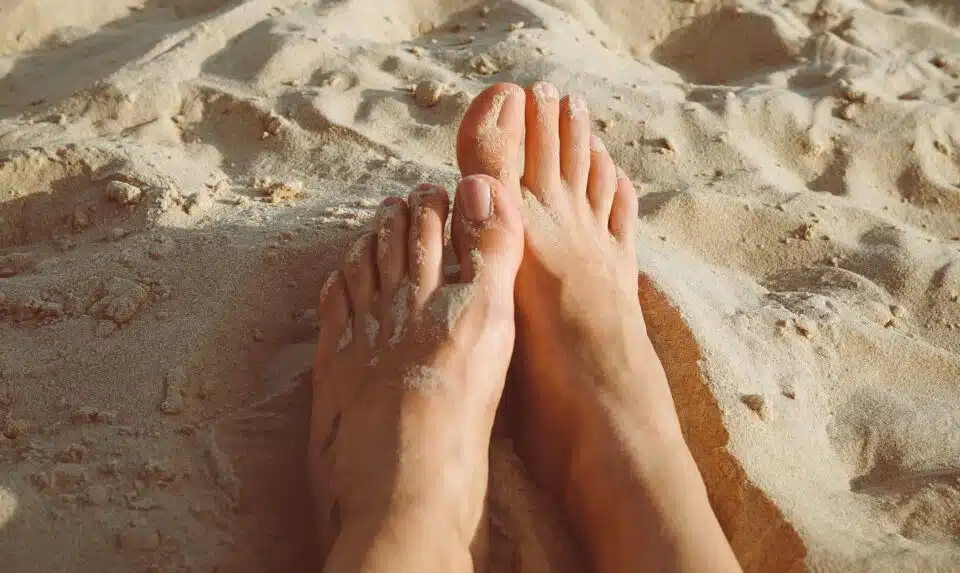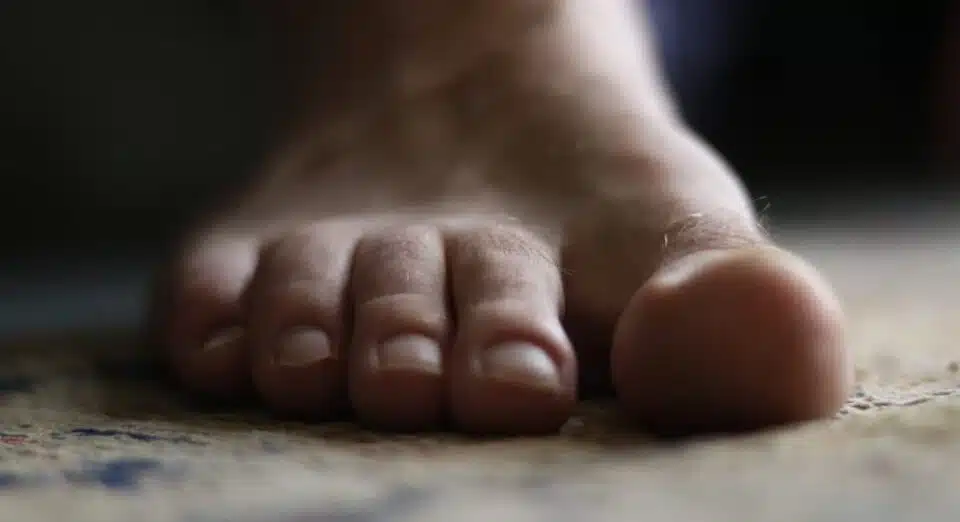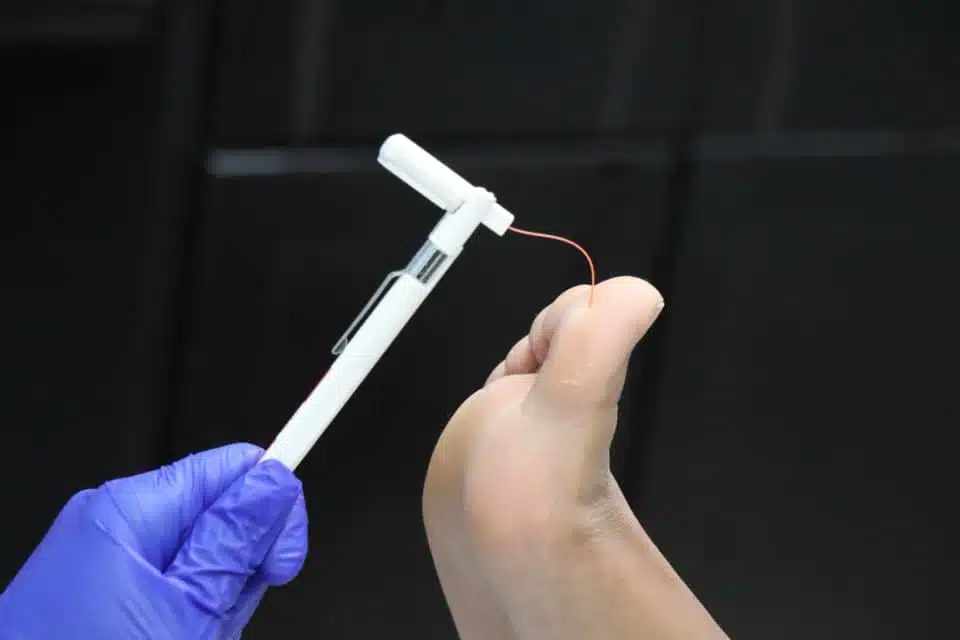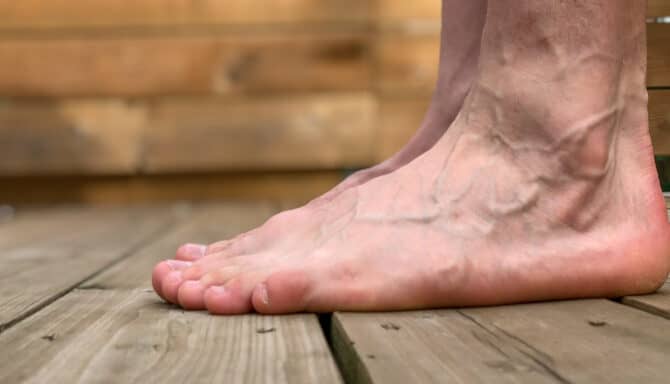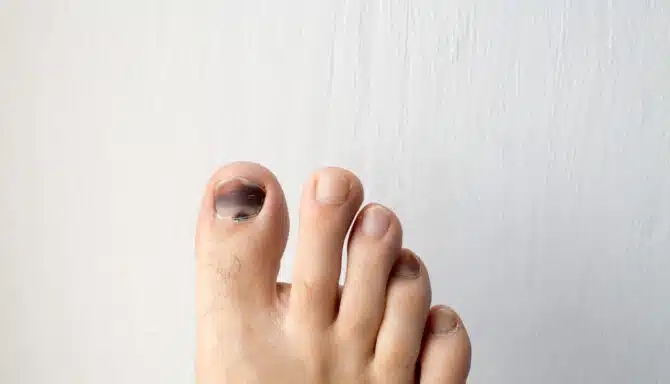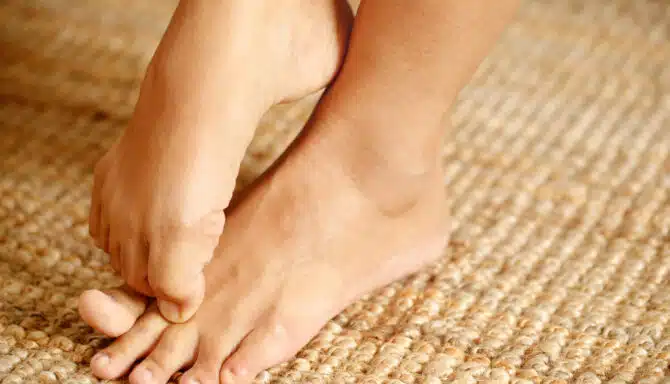Not all foot conditions are associated with pain. Sometimes, the concern stems from the opposite – a lack of feeling. Partially losing sensation or experiencing a tingling feeling in your toes is common. What’s occurring is numbness in your toes.
Numbness in the toes can be caused by various factors, ranging from temporary issues to more serious underlying conditions. Here are some common causes, prevention tips, and guidelines for seeking medical attention.
Causes of numbness in toes
Several foot and toe conditions may cause numbness in your toes. The condition may be acute or chronic, depending on the onset and severity of pain.
Peripheral neuropathy
Diabetes, vitamin deficiencies, or nerve compression often cause damage or dysfunction of the peripheral nerves (nerves outside of the brain). When the peripheral nervous system doesn’t work as intended, you can experience numbness in your hands, feet, and toes. The main symptoms include a burning or sharp sensation or a gradual onset of numbness or prickling. You may also experience pain in random non-painful scenarios, like using a blanket, putting on socks, or standing up.
Nerve compression
Nerve compressions in the foot, like tarsal tunnel syndrome or Morton’s neuroma, can cause numbness in the toes.
Tarsal tunnel syndrome occurs when the tarsal tunnel is compressed. Imagine squeezing a casing of wires: The more pressure against the case, the more stress is put onto the fillings inside. In this case, those would be the nerves, arteries, and tendons inside. Tarsal tunnel syndrome (TTS) is caused by posterior tibial nerve compression as it travels through the tarsal tunnel.
Meanwhile, Morton’s neuroma is a nerve compression that targets the area at the base of the toes. The most common site is at the ball of the foot between the third and fourth toes. As this nerve is thicker than its surroundings, it’s at a greater risk of being blocked, which can cause numbness in the toes. You may feel a numbing sensation or like you have a pebble in your shoe.
Poor circulation
You may experience numbness in your toes due to reduced foot blood flow. For instance, peripheral artery disease (PAD) occurs when blood vessels narrow or are blocked, generally by the buildup of fatty plaque in the arteries.
Raynaud’s
Those who have Raynaud’s may experience numbness in their toes, especially in cold temperatures or times of stress. In Raynaud’s disease, blood-supplying arteries narrow, which reduces blood flow to the area. The most common visible symptom of Raynaud’s is your skin turning pale or blueish.
Frostbite
Frostbite is an injury caused by freezing the skin and underlying tissues. Your skin becomes cold and red, then numb, followed by hardening and paleness. Depending on the severity, you may experience frostnip (the early onset of frostbite, or superficial) or deep frostbite, which involves more severe stages of nerve damage.
Herniated disc
A herniated disk is a nerve impingement in the lower back. When the nerve is pinched, it can radiate numbness down the leg and into the toes. Disk herniation is often the result of ageing and wear and tear over time.
Injury or trauma
Acute injuries, like foot or toe injuries, can cause nerve damage and numbness. Acute injuries may include broken bones, sprains, or fractures.
Prevention for numbness in toes
Preventing numbness in your toes involves a holistic approach to healthy habits, investing in your feet, and practicing good posture. Here’s what we recommend for preventing numbness in your toes:
- Adopt a healthy lifestyle: Proper nutrition, regular exercise, and managing conditions like diabetes can help prevent peripheral neuropathy and circulation problems.
- Supportive shoes: Invest in high-quality footwear made for your foot and its use. Wear specific shoes for the activity if you’re playing sports, or work shoes, depending on your profession. Shoes should provide adequate arch support, protection, as well as cushioning.
- Avoid prolonged pressure on your legs and feet: Avoid sitting or standing in the same position for excessive periods, as it can lead to nerve compression and reduced blood flow.
- Practice good posture: Proper posture and ergonomics can help prevent nerve compression in the lower back. Consider investing in a standing desk or a good chair or revamping your at-home office if you need to improve your posture.
When to see a specialist for numbness in toes
Proactively seeing a doctor when you experience numbness in your toes is recommended. It’s challenging to replicate getting a proper diagnosis, determining the cause, and building a treatment plan at home like you would with a doctor or foot specialist.
However, not all conditions or pain require seeing a specialist. So, how do you know when to see a doctor or foot specialist? Below are a few scenarios for numbness in the toes in which we recommend booking an appointment:
- Chronic or persistent numbness: If numbness in the toes persists for an extended period, despite self-care measures, you should seek medical attention.
- Progressive symptoms: If the numbness worsens over time or spreads to other areas, it’s essential to consult a healthcare professional.
- Pain or difficulty walking: If numbness is accompanied by severe pain or difficulty walking, there may be a more serious underlying condition requiring evaluation by a specialist.
- Traumatic injury: If numbness follows a foot or toe injury, seeking medical attention to rule out nerve damage or fractures is advisable.
- Associated symptoms: If numbness is accompanied by symptoms elsewhere or the symptoms begin to differ, for instance, muscle weakness, loss of coordination, or other neurological symptoms, it should be evaluated promptly.
If you are experiencing any of the above symptoms, you should first visit your family doctor. Your family doctor can order the testing required to properly diagnose (or rule out) potential causes of your toe numbness.
